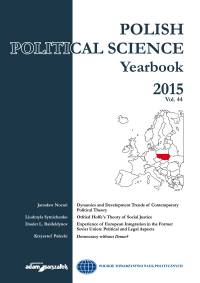LEGAL AND POLITICAL DETERMINANTS OF IMPLEMENTATION OF THE PRINCIPLE OF SUBSIDIARITY IN THE FEDERAL REPUBLIC OF GERMANY
LEGAL AND POLITICAL DETERMINANTS OF IMPLEMENTATION OF THE PRINCIPLE OF SUBSIDIARITY IN THE FEDERAL REPUBLIC OF GERMANY
Author(s): Bożena WroniszewskaSubject(s): Civil Society, Governance, Public Administration
Published by: Wydawnictwo Adam Marszałek
Keywords: political determinants; subsidiarity; Germany; European Union; political organizational system; Federal States; legislative; principle of subsidiarity
Summary/Abstract: It is not surprising that subsidiarity is very often discussed with autonomy and federation (equally multidimensional concepts, similarly discussed in science). It is clearly evident taking into account, for example, results of analysis of the key words (tags) in scientific publications. The European Union has significantly contributed in popularizing of the concept so it is no surprise that strongly linked with EU’s problems has become a central point of the discussion of its organizational structure and internal relationships between forming elements. It is difficult to imagine analysis of the conditions for implementing of subsidiarity in Germany without prior presentation of the state political system’s solutions. Studying the structure and functioning of public administration enables to identify the place and role of the local government, to measure degree of independence of the local authority as a central point of discussion in relation to the subsidiarity.
Journal: Polish Political Science Yearbook
- Issue Year: 44/2015
- Issue No: 1
- Page Range: 238-267
- Page Count: 30
- Language: English

